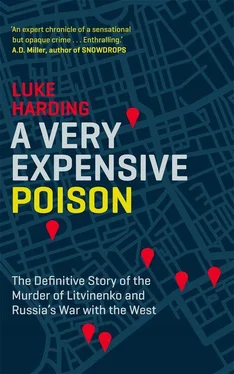Nor were there any signs of a break-in.
Instead, the police moved quickly to the theory that Berezovsky had killed himself. Chief Inspector Kevin Brown, the detective in charge, released a statement saying he was ruling out ‘third party involvement at this stage’. His conclusions were apparently drawn from the medical evidence – there was no obvious sign of foul play – and from interviews with Berezovsky’s associates.
The picture was of a depressed and broken man who in his final months had talked frequently of taking his own life. Navama told police that on one occasion Berezovsky had picked up a steak knife, and demanded: ‘Where should I cut?’ On another he asked his bodyguard: ‘What is the best way to die?’ Berezovsky had also inquired how he might choke himself.
Marina Litvinenko was distraught. She emailed:
Dear Luke
I am still not ready to talk about Boris. It is very painful. I can’t believe this has happened. I am very sorry, just need some time.
Marina
Those in Berezovsky’s grieving circle were unconvinced by this official version of events. After several attempts to kill him, including by the FSB in the 1990s, they suspect he too was murdered, like Litvinenko. ‘I don’t believe in suicide. He could not do it psychologically. He wasn’t this kind of person,’ Dubov told me.
Dubov likened Berezovsky’s death to the locked-room mysteries he used to read as a child growing up in the Soviet Union. He was a fan of the crime novels of the American writer John Dickson Carr, also known as Carter Dickson. Carr specialised in impossible situations, in which murderers would kill their victims from inside a sealed room and vanish without trace. There would be no sign of an exit from windows or a chimney; no footprints in the snowy yard below or roof above.
‘Maybe I’m just influenced by reading too many stories all those years ago,’ Dubov said. ‘I think that given a certain kind of fantasy I could come up with a vision of how it was done.’
Glushkov, who had known the oligarch since 1989, said: ‘I will never believe in the natural death of Berezovsky. The idea that he would have taken his own life is bullshit. You have the deaths of Boris and [his business partner] Badri [Patarkatsishvili] over a short period of time. Too many bodies are happening. I would say this is a little bit too much.’
Litvinenko’s friend Viktor Suvorov agreed: ‘That guy loved life so much. He loved women so much. For me it isn’t possible to imagine he could kill himself.’ Suvorov said he’d hated Berezovsky before he knew him, viewing him as a crook who had destroyed Russia and its chances of turning into a normal democratic country. ‘When I met him I immediately melted. He was such a charming man. A negative genius.’
Some interpreted the circumstances of his death as a coded message from the Kremlin. Berezovsky had disagreed with Putin’s war in Chechnya. In 1999, Putin said of the Chechen rebels: ‘If we catch them on the toilet, we will wipe them out in the outhouse.’ Did Berezovsky’s death in a bathroom, not far from the loo, hark back to Putin’s remark? Others believed Berezovsky may have been helped to commit suicide. They pointed to inconsistencies at the scene: what was Berezovsky’s body doing on the floor?
Meanwhile, Yuri Felshtinsky said he’d spoken to Berezovsky on the phone a few months before his death. ‘He didn’t appear to be suicidal. He had been looking for private schools in the US for his daughter. Boris understood that the Kremlin aimed to destroy him,’ Felshtinsky said.
The late French writer Gérard de Villiers – who specialised in turning real events into lightly fictionalised thrillers – devoted his last novel to Berezovsky. Called Revenge of the Kremlin , it postulates that Berezovsky was indeed murdered. A five-man squad neutralises the estate’s security system, goes into the house, and immobilises Berezovsky before he can reach for his gun. They inject him with an undetectable poison that renders him unconscious, tie his prone body to the shower rail and escape.
These suspicions, of course, proved nothing. But they spoke volumes about the expectations of Kremlin behaviour. After Litvinenko’s murder, the idea that the Russian government might assassinate a well-known political critic living in exile, in a country with which Russia was not at war, was all too believable.
In 2007, Scotland Yard had intercepted yet another plot to kill him. The alleged assassin was a Paris-based Chechen, Ruslan Atlangeriev. Police advised Berezovsky to leave the country for a few days; he flew to Israel. Atlangeriev was caught trying to break into Berezovsky’s Mayfair office. He was deported back to Russia, where he disappeared.
There was also the strange matter of the T-shirt.

In July 2010, Berezovsky met with a business associate from his Moscow days, Rafael Filinov, in London. Filinov also knew Andrei Lugovoi. Filinov delivered a present from Lugovoi for Berezovksy – a black custom-made T-shirt printed on the front and back.
The T-shirt didn’t win any prizes for subtlety. On the front were the words ‘Polonium-210, CSKA, London, Hamburg, to be continued’, around a red star logo of the CSKA football team. On the back: ‘CSKA Moscow, nuclear death is knocking your door’.
Was this a sick joke? Or a warning that Berezovsky was next? The oligarch’s assistant, Michael Cotlick, said Berezovsky held the T-shirt up and exclaimed: ‘Look what Lugovoi has sent me.’ They came to the conclusion that it wasn’t a threat, though what it portended was unclear. Cotlick gave the T-shirt to Scotland Yard. It joined the mountain of evidence against Lugovoi.
The Kremlin had put enormous pressure on Berezovsky over a period of many years – though his courtroom defeat was surely self-inflicted. In Moscow, Dmitry Peskov, Putin’s press spokesman, claimed that Berezovsky had written a letter to Russia’s president shortly before his death requesting forgiveness. Berezovsky begged to come home to Russia, Peskov said. The letter was never published.
Meanwhile, a Russian reporter from Forbes claimed to have interviewed Berezovsky in London’s Four Seasons Hotel the evening before his death. Berezovsky allegedly told the reporter, Ilya Zhegulev, he yearned for Moscow and had ‘over-estimated’ the west. Berezovsky drank a cup of tea with honey.
These Moscow-inspired media reports looked and sounded self-serving. Deconstructed, they amounted to a Kremlin morality tale: if you oppose legitimate Russian power, you end up in exile, broke, friendless and ultimately dead. Nikolai Kovalyov, the former head of the FSB, probably best summed up the Kremlin’s real feelings towards the late oligarch. Kovalyov told Russian TV that Berezovsky had got what he and other traitors deserved – an unpleasant end.
* * *
Berezovsky’s funeral took place in May 2013. Six weeks had passed since his death. Around thirty mourners – family, friends and lawyers – attended. There was tight security. The ceremony was in Brookwood Cemetery near Woking in Surrey. The service took place in a small brick chapel, overlooked by suitably Russian pines and silver birches, and under a dull, pearl-grey sky.
One guest arrived in a Bentley. There were several Mercedes. I travelled by rail, reporting on the event for the Guardian . Others dressed in black and bearing white lilies came on the same modest suburban train to Brook-wood Station. Zakayev turned up with his son Shamil; we chatted briefly. Berezovsky’s daughter Yelizaveta brought flowers. It was a strikingly understated send-off for a man who had lived and blazed in the public eye, in Russia and the UK.
Читать дальше













